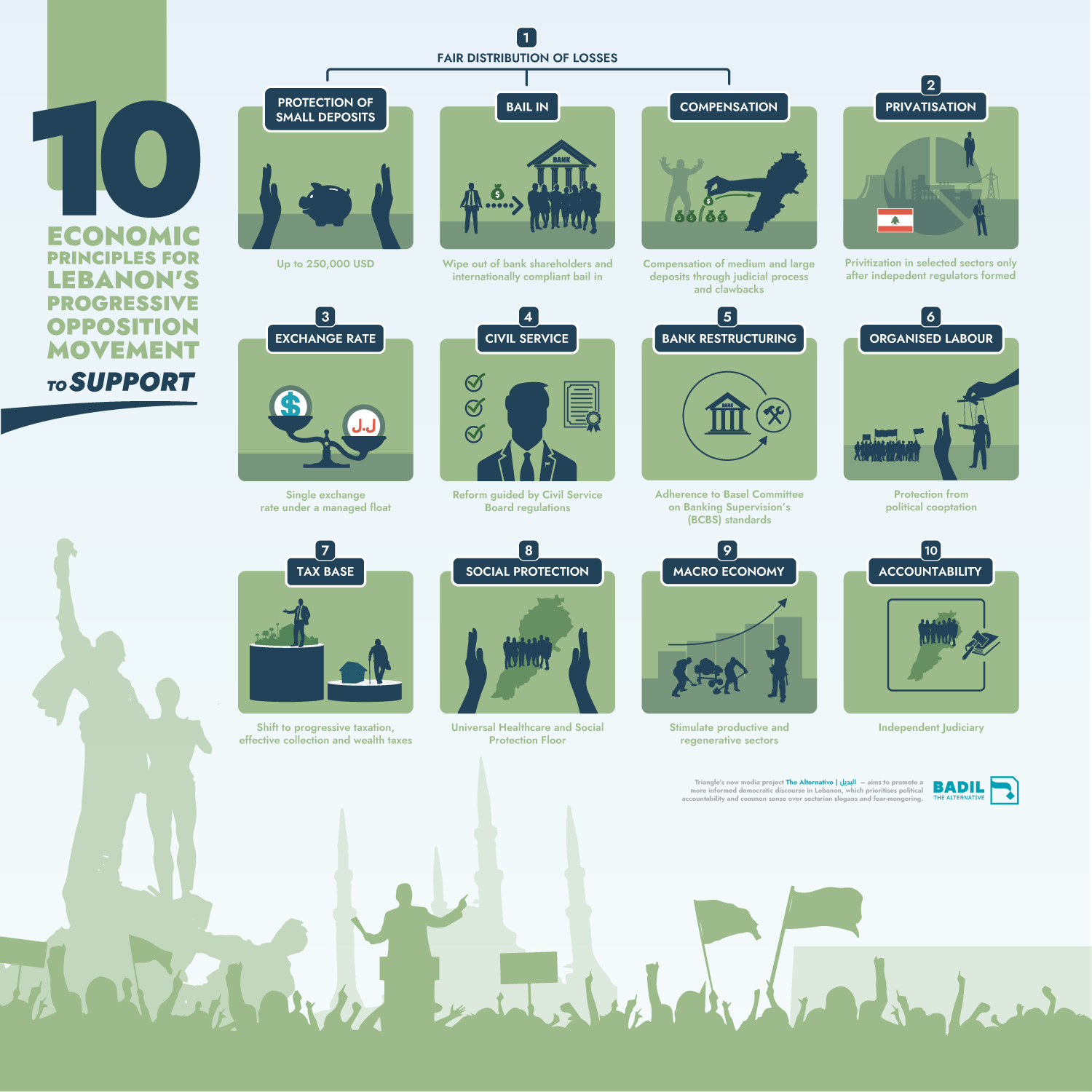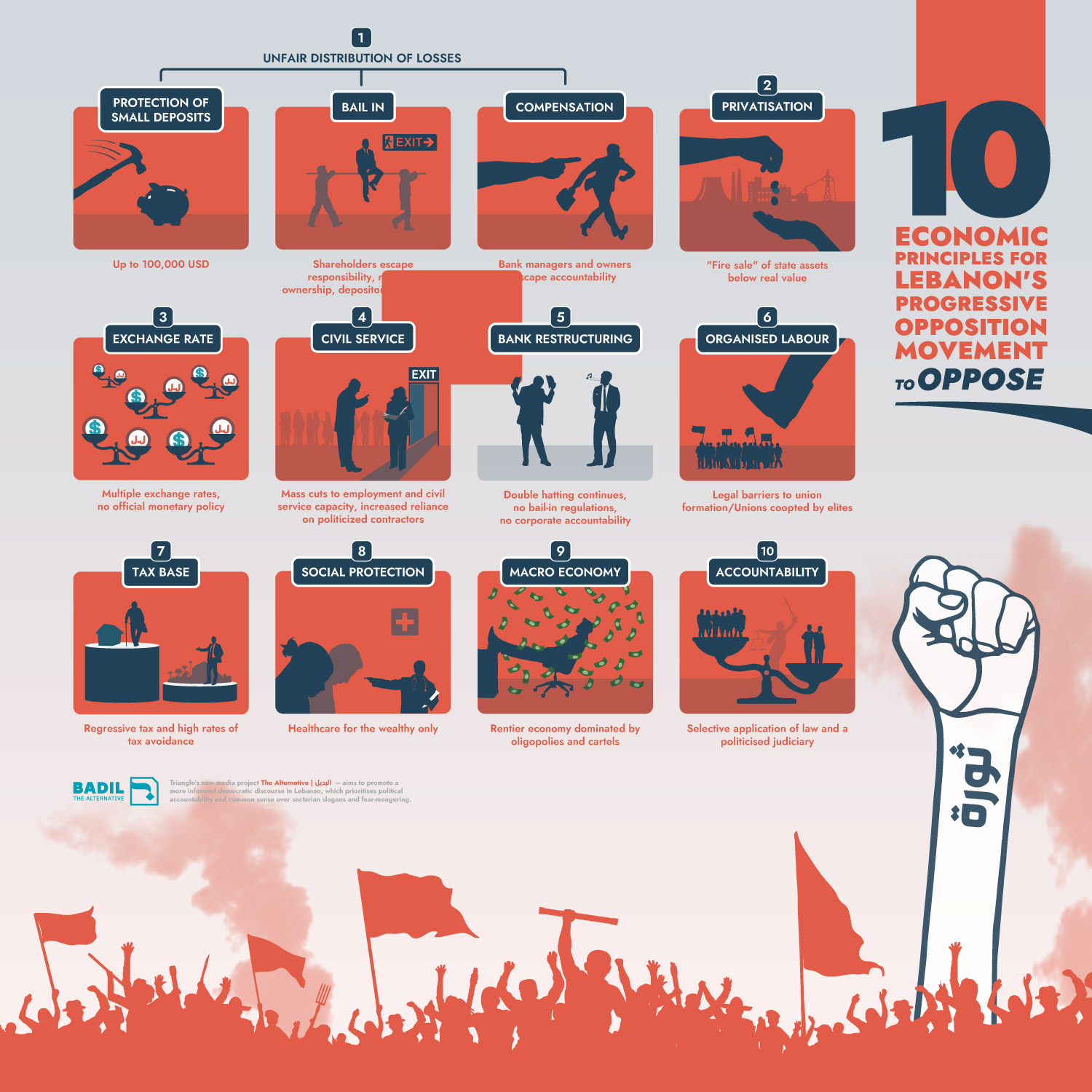Principle 1
A Fair Distribution of Losses
Protection of Small Deposits: The recapitalisation and restructuring of the banks – as the first step towards a revived Lebanese economy – must begin with the clear protection of small deposits in line with international standards. In Lebanon setting this protection limit at $250,000 is necessary to return confidence and liquidity to the vast majority of depositors. At this level, bank shareholders responsible for the losses incurred during the past 2.5 years shoulder real responsibility for reliquidating their companies. Setting the limit at $100,000, which the government has presently done, will mean a larger proportion of the losses must be covered by depositors, not to mention the fact that this figure may well be whittled down in future negotiations. Once small deposits are protected at $250,000, any capital control regime should allow smaller depositors greater access to their deposits first. Then, a graduated bail-in must follow.
Internationally Compliant Bail-in & Recapitalisation: The conditions of a bail-in to recapitalise commercial banks must follow international standards which stipulate a 100% wipe-out of existing shareholders, change of bank management, and corporate governance re-regulation. The shareholders of Lebanon’s banks — among whom are counted names such as Saad Hariri, Marwan Kheireddine, Adnan Kassar, Taha Mikati, as well as other politicians or their relatives — have profited massively from the banking sector’s risky operations, and most have extensive offshore assets which can be used to recapitalise the banks. In Lebanon’s case, the bail-in will need to follow a waterfall scheme guided by the international standard of ‘Total Loss Absorption Capacity’ (TLAC). After allocating losses to the central bank, a certain proportion of larger depositors will have to contribute to the recapitalisation. Their contribution should however be matched by appropriate compensation mechanisms.
Compensation of Medium & Large Depositors: Any additional debtholders (including depositors) who are forced to contribute to the bail-in should receive appropriate compensation to uphold the principle of depositors’ protection from the mistakes of bank shareholders and managers. Compensation can be achieved through a combination of share allocations from the depositors’ new bail-in shares. But more importantly, reclaiming the assets and income of bank management over time through clawback mechanisms will be essential. In Lebanon, these clawbacks can be extended through legislation to those who engaged in ‘financial engineering’, enabled illegal capital offshoring and other illegal practices. These judgments need will need to enforced through an independent (and internationalised) legal authority.
Principle 2
Privatization Prerequisites
At present, the process of recapitalising banks or paying down debt should not involve the privatisation of state assets, as has been suggested by the Association of Banks in Lebanon. Doing so in such a circumstances would rob the state of potential revenue-raising assets at a devalued rate. Instead, any privatization public assets should be delayed until four key prerequisites are fulfilled: conditions are favourable for public asset prices to recover, governance of key sectors has been reformed, a competition authority has full oversight capacity, and strong independent regulators have the administrative and financial capacity to place checks on private sector abuses.
Principle 3
Legally Managed Exchange Rate Policy
Further, maintaining the real value of deposits is essential for any economic recovery, and indeed the prospect of paying back the IMF after a final financial rescue plan (FRP) has been agreed. Devaluing foreign currency deposits through conversion to a devalued Lira fan the flames of inflationary pressure and devalue the national savings portfolio. As a result, the progressive opposition and depositors must reject outright any and all involuntary or forced conversions of foreign currency deposits into Lebanese Lira, as well a rejection of continued illegal multiple exchange rate policies—all of which constitute the defacto transfer of banking sector losses to small depositors and syndicate pension funds. In this vein, the opposition also needs to pressure the IMF to need to reverse its endorsement of a special exchange rate on customs dollars proposed in the 2022 budget, as well as clarify the Fund’s position with regard to illegal multiple exchange rates.
Instead of multiple exchange rates, Lebanon needs to enter into a managed float of the Lira, within a band of rates periodically set by Parliament. This approach policy would allow the BDL flexibility to use monetary policy legally as and when necessary, while staying accountable to the Parliament, as per the law.
Principle 4
BDL & Banking Sector Reform
Regardless of who owns them, Lebanon’s 62 banks will need to be restructured following an independent forensic audit of both BDL and the 14 alpha banks – as stipulated by the IMF. This process will be necessary to recapitalise the surviving banks and reset their management structures—something which should be conducted with a view to avoid a similar banking crisis from ever happening again. In order to see that happen, Lebanon’s banking regulations also need to adhere to the Basel Committee on Banking Supervision’s (BCBS) standards. Lebanon should become a signatory of the BCBS’ regulatory frameworks and submit itself to monitoring through the BCBS’s Regulatory Compliance Assessment Program (RCAP).
One of the reasons reforms were not realised in the past was the conflicts of interest within BDL’s governance structures, which placed too much power within the hands of a compromised governor and political appointees. The ministerial representatives provide direct, systemic political influence over BDL’s regulatory bodies, while the compromised BDL governor heads the three key BDL oversight bodies. This practice, known as double hatting, extends throughout Lebanon’s banking sector but is prohibited by the BCBS,[1] because it minimises internal accountability.
Principle 5
No cuts before civil service reform
Lebanon’s public sector is rife with disfunction and has long been used by political elites as a key patronage mechanism. Yet the preservation of public sector employment is key to the functioning of the state and the livelihoods of 300,000 workers, many of whom are temporary contract workers. Thus, opposition figures need to reject blanket cuts to the civil service. Instead, civil service reforms which integrate temporary contract workers in the permanent staffing reforms developed by the Office of the Minister for State and Administrative Reform (OMSAR), need to be put in place. That process will need to be managed and enforced through the Civil Service Board, in order to ensure that meritocracy wins over patronage.
Principle 6
Revival of Organised Labour and Syndicates
In Lebanon, legal restrictions and political co-optation have made redundant most organised labour bodies capable of providing a counterbalance to the exploitative power of business interests. Even the IMF recognises unions as a key voice in civil society because worker’s rights are an important factor for a healthy economy. Unions not only represent a crucial means of economic bargaining and solidarity but are also important for creating alternative forms of group identity and social structures outside of the dominant sectarian paradigm that pervades all areas of life in Lebanon.
Reviving the function of unions in Lebanon starts with the ratification and implementation of the ILO Convention 87 on Freedom of Association and Protection of the Right to Organise, which guarantees of the right of workers and employers to establish their independent organizations provided by the Convention. Currently large sectors of the workforce – some agricultural workers, migrant workers, civil servants (including the military), and liberal professions – are excluded wholly or partially from these rights.
Principle 7
Fair Taxation
Any financial rescue plan must allow for the fiscal space to pay back loans to the IMF or other creditors in a manner which is progressive and fair on the Lebanese people. Such fiscal sustainability requires a revenue structure which is based not on the imposition of indirect and regressive taxes and fees, but on progressive taxation, including graduated income tax and wealth taxes. The removal of banking secrecy—which enables tax evasion money laundering among other illegal practices—is core to realising the real value of Lebanon’s potential tax base. Accompanying this must be improved tax collection administration, with appropriate monitoring and technical capacity building, including IMF officers stationed in government ministries.
Such reforms would garner public support, which the IMF will need as the pain of any reform programme takes hold. The money generated from a wider and more efficiently collected tax base should be used as the key mechanism to balance the major inequalities within Lebanese society, namely through health insurance and social protection schemes. According to Triangle’s estimates at the start of the financial crisis, brining Lebanon in line with the average OECD top tier tax rates could generate up to USD 6.5 billion, annually. Even if halved (now that the country is that much poorer) the amount generated by such a move would generate more than the IMF has offered Lebanon in total, every year.
Principle 8
Funding Social Protection
The country’s unprecedented economic crisis has gutted key medical coverage on which many Lebanese previously relied. Even before the crisis, the majority of Lebanese, migrant workers, and refugees had no access to health insurance and paid relatively high rates for basic services in Lebanon’s privatised healthcare system. Thus, the primary goal of insurance reform should be the revival of the NSSF, the consolidation of currently fragmented schemes, and the establishment of a Social Protection Floor. Progressive taxation (and smart fascial policies such as earmarked taxation on empty properties) must be used to properly fund the NSSF to a degree where it is able to eventually provide universal health care. In the short term, the private sector – with its glaring deficiencies – will remain the only immediately viable path to increasing social protection in Lebanon. As such, future policy should impose regulations to broaden access to coverage to ensure cover for as many residents as possible are covered, not least through an independent regulatory body separated from the Ministry of Economy and Trade.
Principle 9
A Productive & Regenerative Economy
Decades of economic exploitation and environmental neglect have left Lebanon’s natural resources and productive capacity in shambles. Basic necessities like air, water, and soil are degraded to the point that they now severely damage human health. The way financial institutions and economic policies are shaped has a direct role in this, and can be reversed. The central bank, commercial banks, and cooperatives must be directed towards working for the broader economy by lending to sectors that diversify and fortify Lebanon’s economic potential needs to shift away from reliance on rentier sectors such as real estate and finance. Not only will this provide higher employment for Lebanon’s vocational classes, it will also drive investment, skills and innovation to areas such as renewable energy, sustainable farming, and agri-tech where Lebanon has the potential to be a regional leader. Perhaps more than any other country in the region, Lebanon needs to rapidly invest in renewable energy to insulate itself from volatility in the energy market and the reality of the nation’s declining ability to pay for imported fuels. Government and central bank policies can directly stimulate this investment and such conditions should be central to the country’s macro-economic recovery plans, given its flow-on effects on the economy and society.
Principle 10
Accountability
It’s no secret that Lebanon suffers from a lack of legal and political accountability across all sectors. The criminal political and business class that runs Lebanon has escaped accountability for years through legal loopholes and a lack of judicial independence. This selective application of the rule of law has been a key driver of the state’s decline. Even now, faced with the prospect of being forced by the IMF to adopt changes that may impede their power – such capital controls and a repeal of banking secrecy – politicians are still trying to build in exceptionality clauses which allow their selected cronies to choose when the law applies and when it doesn’t. Citizens within a state must be treated as equal – there is no two ways about it – and their leaders should be held to a higher, not lower standard. The parliamentary committee that has been sitting on the draft judicial independence law since 2019 must open is deliberations to public scrutiny and assessment by the Venice Commission against international standards. Once the law is brought in line with international standards, it must be passed and applied in full and without exception.
***
The progressive opposition, with all of its existing disadvantages, cannot miss another opportunity to offer the public an alternate way out of Lebanon’s historical financial catastrophe. This effort must clearly counteract the half-baked reforms the ruling classes hope will placate the IMF and garner them more time to pillage Lebanon for decades to come. Otherwise, whatever the result of the elections, the Lebanese will ultimately lose faith in the opposition, making a real alternative all the more difficult to attain.





